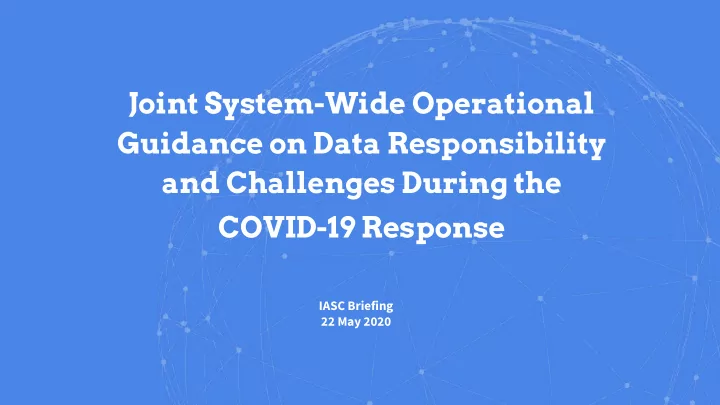

Joint System-Wide Operational Guidance on Data Responsibility and Challenges During the COVID-19 Response IASC Briefing 22 May 2020
UNHCR’s experience advancing Data Responsibility
INTRODUCTION TO DATA RESPONSIBILITY Data Responsibility is the safe, ethical, and effective management of data . It entails a set of principles, processes and tools that seek to leverage data to improve people’s lives in a responsible manner. It works to ensure people’s rights to consent, privacy, security and ownership around the information processes of collection, analysis, storage, presentation and reuse of data while respecting the values of transparency and openness
INTRODUCTION TO DATA RESPONSIBILITY - Safe: Reflective of data protection, data privacy and data security, data sensitivity - Ethical : Ethical conduct in data activities and evidence generation is derived from humanitarian ethical principles and but also ethical issues associated with data. This is necessary both in its own right and as a significant contributor to ensuring quality and accountability in the evidence generated. - Effective: Data and information management is efficient, is purpose driven, is sustainable, is usable to inform decision making, and is interoperable as appropriate.
- - - - - - - - - - - - - - - -
Data Responsibility in Humanitarian Action
OVERVIEW The Centre’s data responsibility work is focused on developing a framework and guidelines for how OCHA manages data in humanitarian crises. This work also contributes to increasing trust and cooperation across organizations sharing data in 2.2 2.2 2.3 humanitarian response.
CONVENING AND CONNECTING FOR COLLECTIVE ACTION We also work to catalyze collective action around data responsibility in humanitarian action.
Improving data responsibility requires individual and collective action .
Developing Joint System-Wide Operational Guidance on Data Responsibility
BACKGROUND The Sub-Group on Data Responsibility in Humanitarian Action was initiated in January 2020 under the auspices of the Inter-Agency Standing Committee (IASC) Results Group 1. The Sub-Group is co-led by the OCHA Centre for Humanitarian Data , the International Organization for Migration (IOM), and the United Nations High Commissioner for Refugees (UNHCR). The primary objective of the Sub-Group is to develop joint, system-wide guidance on data responsibility for endorsement by the IASC. Once endorsed, this operational guidance will serve as a benchmark for key actions and accountabilities vis-a-vis data responsibility in humanitarian action.
MEMBERS OF IASC SUB-GROUP ON DATA RESPONSIBILITY IN HUMANITARIAN ACTION
OBJECTIVES OF THE SUB-GROUP ➔ Develop joint system-wide operational guidance on data responsibility through a consultative process ➔ Secure IASC endorsement of the operational guidance ➔ Devise a strategy for implementation of the operational guidance following formal endorsement ➔ Build a community of practice around data responsibility in humanitarian action
PROGRESS TO-DATE ➔ Desk Review of existing policies, guidance, and other relevant documents on data responsibility ➔ Public Survey to identify priority issues to be addressed in the operational guidance (396 responses + 78 countries) ➔ Development and first revision of complete draft operational guidance for review at global and field levels
REACH OF THE SURVEY 396 responses 78 countries represented 45% NGO respondents, 42.5% UN, 12.5% Other
KEY FINDINGS FROM THE SURVEY ➔ Respondents identified data confidentiality , data security , and do no harm as the three most important principles for data responsibility in humanitarian action. ➔ Respondents selected data protection ; data ethics ; assessing risks, harms, and benefits ; and data sharing as the most important themes that the guidance should address. ➔ The majority of respondents said that the guidance should offer recommendations for actions at both the cluster/sector & organization level . ➔ Many respondents noted the importance of multi-stakeholder approaches and collective action on data responsibility , and noted that the guidance should complement other inter-agency initiatives already underway.
DATA RESPONSIBILITY IN THE COVID-19 RESPONSE The Sub-Group developed an FAQ on Data Responsibility in the COVID-19 Response to bring together existing guidance and offer practical tips for how to address common challenges and opportunities related to data management in the response. Available here: 2.2 https://data.humdata.org/faq-data-responsibility-covid-19
IOM’s experience advancing Data Responsibility
BACKGROUND IOM has always had a culture of the practical and principled approach towards data responsibility considering its operational focus. IOM has developed a number of guidance and policies ( Data Protection Manual , Migration Data Governance Policy , Reporting Standards and Framework for the Ethical use of Advanced Data Science Methods etc ) allowing for the continued accountability, transparency and efficiency regarding migration and displacement data usage, handling and sharing.
PROMOTING SECTOR-WIDE EFFORT FOR DATA ETHICS - 2014 saw advocacy for the sector wide principle-based standards on data ethics - Collaboration with UNHCR and a range of other actors in the Protection Information Management initiative - Development of Ethical Obligations for Humanitarian Information Activities by Harvard Humanitarian Initiative with support from IOM
LESSONS LEARNED ➔ Data responsibility is multi-faceted and not exclusive to one area (ICT, Legal, HR, Programmes, etc.) ➔ A collaborative approach to principles and guidance is critical for all layers of the organisation and the system ➔ Given the architecture of the system, it is critical that we have both our own organizational policies and collective guidance , developed through a coordinated process
Data Responsibility in Humanitarian Action
Recommend
More recommend